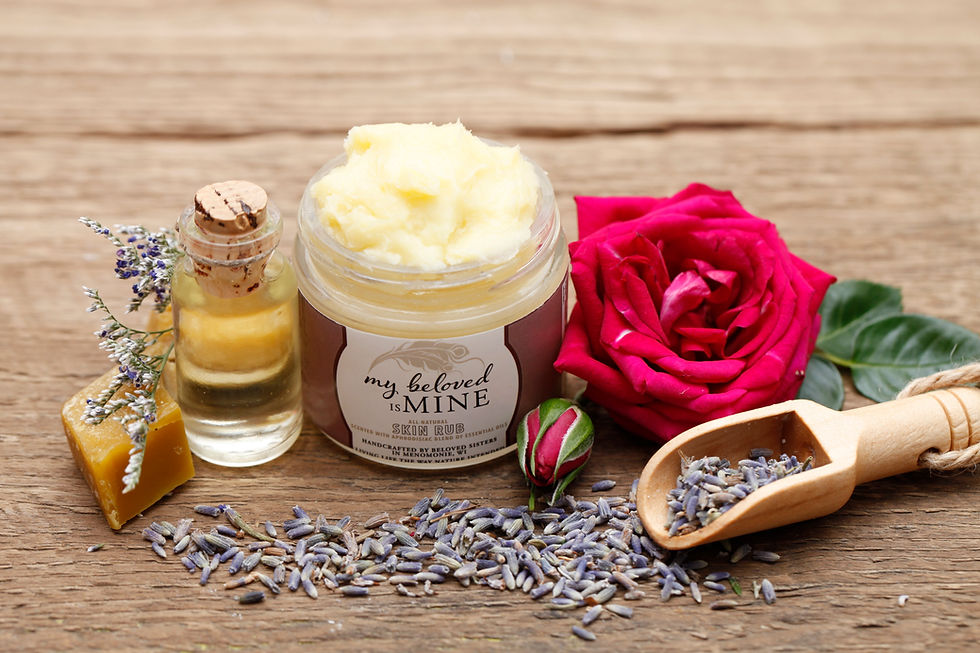Do You Know What’s in Your Skincare?
- Serge and Veronika
- Jun 17, 2019
- 3 min read
Updated: Apr 2, 2025
According to the U.S. Food and Drug Administration (FDA), “all skin care products that aren’t classified as soap are considered cosmetics.” That may sound reassuring—after all, if it's labeled a cosmetic, it must be safe and regulated, right?
That’s what I used to believe too.
I assumed the lotions, creams, body butters, and bath products I brought home had all been rigorously tested for safety, allergies, and long-term effects. The truth? Not quite.
While the FDA does have final authority over cosmetics, it does not actually regulate the manufacturing process or control the ingredients used in most skincare products. That means companies can include questionable, even toxic, substances without thorough testing or labeling requirements—and they often do.
The Harsh Reality of "Natural" Skincare
The only real way to be sure about what’s in your body products? Make them yourself.Now, I get it—that can feel intimidating or unrealistic. You may not have the time, the tools, or the know-how. But even if you never make a single product at home, it’s still worth educating yourself. The more you know, the better choices you can make for your health and the health of your family.
And that starts with one simple habit: READ THE INGREDIENTS.Don’t let pretty labels, eco-friendly fonts, or soothing scent names lull you into a false sense of safety. Flip that bottle around and take a real look at what’s inside.

My Personal Wake-Up Call
Like many others, I used to shop based on sales, coupons, and free product deals. I couldn’t resist a good bargain, especially at popular bath and body stores. If it looked beautiful and smelled divine, into my basket it went. But eventually, I started learning more about what I was actually putting on my skin—and that “free” product wasn’t so free after all.
After switching to so-called “natural” and “organic” skincare brands, I decided to do a little digging. I grabbed a few of the remaining products from my bathroom and jotted down some of the ingredients I didn’t recognize—even from the natural products. Here are just a few that showed up:
Cetearyl Alcohol
Polysorbate 60
Stearic Acid
Phenoxyethanol
Potassium Sorbate
Aromatic Extract
This isn’t even from the conventional products—these are from items labeled as natural. Imagine what’s hiding in the rest!
What the Research Reveals: Common Toxic Ingredients in Skincare
An eye-opening article I came across listed dozens of ingredients commonly found in skincare products that are known or suspected to be harmful. Here are just some of the most concerning:
Petrolatum & Mineral Oil – By-products of gasoline refining, known carcinogens.
Parabens – Preservatives that mimic estrogen and disrupt hormones, potentially cancer-causing.
BHT (Butylated Hydroxytoluene) – Linked to liver/kidney toxicity, allergies, hyperactivity, and skin rashes.
Titanium Dioxide, Triethanolamine (TEA), DMDM Hydantoin – Known or suspected carcinogens.
Methylisothiazolinone – Neurotoxic, even in small amounts.
Sodium Hydroxide (Lye) – Also used in drain cleaners.
Polysorbate 80 & Ceteareth-20 – Often contaminated with 1,4-dioxane, a potent toxin.
EDTA – A hormone disruptor and skin irritant.
Phenoxyethanol – May suppress the central nervous system and cause severe reactions in infants.
Diazolidinyl Urea – Releases formaldehyde, a known carcinogen.
Propylene Glycol & Butylene Glycol – Found in antifreeze, associated with skin irritation and allergic reactions.
Even more ironically, many of these chemicals are directly linked to the very skin conditions—like dermatitis, eczema, and acne—that these products claim to soothe.
“Natural” Isn’t Always What It Seems
Another author conducted a casual survey of popular “natural” brands found in health food stores and was surprised by what they found:
Unlisted “fragrance” ingredients (almost always synthetic)
Harsh preservatives like sodium benzoate and potassium sorbate (the former forms benzene, a known carcinogen, when combined with Vitamin C)
Synthetic vitamins listed by chemical name, which may be ineffective or even toxic
Polyunsaturated oils like soy, corn, safflower, canola, and sunflower, which are highly processed and prone to rancidity—leading to free radical production that damages cells and accelerates aging
In other words, even “natural” products often aren’t what they claim to be.
What Can You Do?
Start reading ingredients. If you don’t recognize something, look it up—or skip the product entirely.
Avoid synthetic fragrances, preservatives, and colorants.
Choose brands with transparency—those that fully disclose their ingredients and use organic or food-grade inputs.
Better yet—learn to make your own. Even something as simple as a DIY body butter, face oil, or bath soak can go a long way toward reclaiming control over what you put on your skin.
You don’t have to overhaul your entire bathroom overnight. But each step you take toward cleaner, safer products is a step in the right direction.
Because at the end of the day, your skin is your largest organ—and what you put on it matters.




Comments